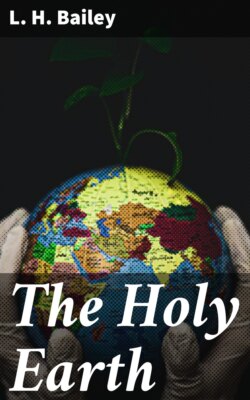Читать книгу The Holy Earth - L. H. Bailey - Страница 7
На сайте Литреса книга снята с продажи.
It is kindly
ОглавлениеTable of Contents
We hear much about man being at the mercy of nature, and the literalist will contend that there can be no holy relation under such conditions. But so is man at the mercy of God.
It is a blasphemous practice that speaks of the hostility of the earth, as if the earth were full of menaces and cataclysms. The old fear of nature, that peopled the earth and sky with imps and demons, and that gave a future state to Satan, yet possesses the minds of men, only that we may have ceased to personify and to demonize our fears, although we still persistently contrast what we call the evil and the good. Still do we attempt to propitiate and appease the adversaries. Still do we carry the ban of the early philosophy that assumed materials and "the flesh" to be evil, and that found a way of escape only in renunciation and asceticism.
Nature cannot be antagonistic to man, seeing that man is a product of nature. We should find vast joy in the fellowship, something like the joy of Pan. We should feel the relief when we no longer apologize for the creator because of the things that are made.
It is true that there are devastations of flood and fire and frost, scourge of disease, and appalling convulsions of earthquake and eruption. But man prospers; and we know that the catastrophes are greatly fewer than the accepted bounties. We have no choice but to abide. No growth comes from hostility. It would undoubtedly be a poor human race if all the pathway had been plain and easy.
The contest with nature is wholesome, particularly when pursued in sympathy and for mastery. It is worthy a being created in God's image. The earth is perhaps a stern earth, but it is a kindly earth.
Most of our difficulty with the earth lies in the effort to do what perhaps ought not to be done. Not even all the land is fit to be farmed. A good part of agriculture is to learn how to adapt one's work to nature, to fit the crop-scheme to the climate and to the soil and the facilities. To live in right relation with his natural conditions is one of the first lessons that a wise farmer or any other wise man learns. We are at pains to stress the importance of conduct; very well: conduct toward the earth is an essential part of it.
Nor need we be afraid of any fact that makes one fact more or less in the sum of contacts between the earth and the earth-born children. All "higher criticism" adds to the faith rather than subtracts from it, and strengthens the bond between. The earth and its products are very real.
Our outlook has been drawn very largely from the abstract. Not being yet prepared to understand the conditions of nature, man considered the earth to be inhospitable, and he looked to the supernatural for relief; and relief was heaven. Our pictures of heaven are of the opposites of daily experience—of release, of peace, of joy uninterrupted. The hunting-grounds are happy and the satisfaction has no end. The habit of thought has been set by this conception, and it colors our dealings with the human questions and to much extent it controls our practice.
But we begin to understand that the best dealing with problems on earth is to found it on the facts of earth. This is the contribution of natural science, however abstract, to human welfare. Heaven is to be a real consequence of life on earth; and we do not lessen the hope of heaven by increasing our affection for the earth, but rather do we strengthen it. Men now forget the old images of heaven, that they are mere sojourners and wanderers lingering for deliverance, pilgrims in a strange land. Waiting for this rescue, with posture and formula and phrase, we have overlooked the essential goodness and quickness of the earth and the immanence of God.
This feeling that we are pilgrims in a vale of tears has been enhanced by the wide-spread belief in the sudden ending of the world, by collision or some other impending disaster, and in the common apprehension of doom; and lately by speculations as to the aridation and death of the planet, to which all of us have given more or less credence. But most of these notions are now considered to be fantastic, and we are increasingly confident that the earth is not growing old in a human sense, that its atmosphere and its water are held by the attraction of its mass, and that the sphere is at all events so permanent as to make little difference in our philosophy and no difference in our good behavior.
I am again impressed with the first record in Genesis in which some mighty prophet-poet began his account with the creation of the physical universe.
So do we forget the old-time importance given to mere personal salvation, which was permission to live in heaven, and we think more of our present situation, which is the situation of obligation and of service; and he who loses his life shall save it.
We begin to foresee the vast religion of a better social order.
